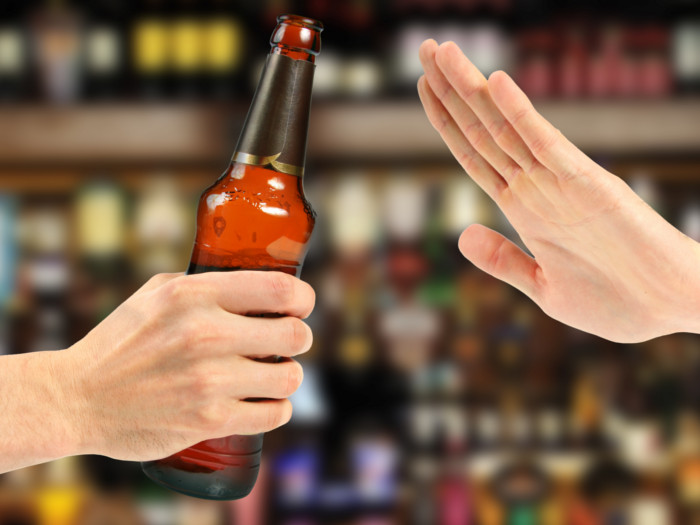Dry January is more popular now than ever, with more people pledging to give up alcohol for a month in order to look after their health and save some money. With so many people taking up the challenge, are there any health benefits linked with drinking less?
What is Dry January?
For many people, January is a time to start afresh and to make new resolutions for the year ahead. For some, their resolution is to drink less or to start a detox from the excessive drinking that often happens over the festive season; this is what is popularly known as Dry January.
Dry January can have great health benefits when approached the right way. It won’t do any harm for you to take part in dry January, but you are more likely to get better health benefits from it if you consider it as a springboard to reevaluate your relationship with alcohol on the whole.

Drinking too much alcohol can cause fatty liver disease and inflammation of the liver. Photo Credit: Shutterstock
You May Lose Weight
It’s no secret that alcohol is heavy on the calories. At around 7 calories per gram, a standard glass of wine, on average, contains 130 calories, whereas a pint of beer is anything upwards of 330 calories. Many people eat and drink a lot more over Christmas and New Year, so any decrease in food and drink consumption in the wind-down afterward is sure to see a loss in weight.
A 2017 study found that those who binged on alcohol at least once a month over the course of a year were 41% more likely to become overweight in a 5-year period, so any decrease in the amount that you drink is sure to provide you with both short and long term health benefits. [1]
Alcohol contributes a lot of calories in one unit without making us feel satisfied and can even increase our hunger levels. As alcohol also has a dehydrating effect, this then leads to bloating, making you feel not so great.
You Will Sleep Better
If you typically drink most nights of the week, then you’re going to be having less good-quality sleep and will be more inclined to skip workouts and binge eat. All this has an impact on your productivity and how you feel overall. Whilst it is true that a nightcap can help you fall asleep faster, alcohol disrupts the restorative phase of sleep which occurs later on in the night.
Drinking less will help you to feel much more clear headed and you’re likely to experience a better quality of sleep. This, in turn, will help you to feel more energetic the following day and keep motivated when it comes to workouts and overall sticking to healthier habits.

Sleeping has many health benefits, such as good mood, better productivity and more. Photo Credit: Shutterstock
Your Skin Will Feel And Look Better
Alcohol acts as a diuretic, which increases the loss of fluids and leads to dehydration. Whilst we all know that this isn’t good for your overall well being, dehydration can have a huge impact on the skin and cause damaging, lasting effects. People who regularly drink alcohol may notice that their skin has a dry and dull complexion or tend to have flushed cheeks or rosacea on their face or neck.
When people stop drinking, they are more likely to get more calories from foods, which then increases their vitamin intake and makes skin appear healthier. When you stop drinking alcohol, you may notice that you are more aware of your actual thirst levels, so staying hydrated throughout the day will keep you feeling alert and refreshed, whilst also having a great lasting effect on the overall appearance of your skin.

An ideal makeup is the one that looks seamless. Photo Credit: Shutterstock
You Can Reevaluate Your Relationship With Alcohol
When dry January is over, it’s always good to check in with yourself and evaluate how you think the experiment went. What does this mean for your drinking habits moving forward? Do you feel healthier for it? Have you saved money? You may find that you feel the same or miss the social aspects of going out for drinks with friends. All of these things are useful takeaways to consider following on from the experiment.
Conclusion
If you give up alcohol for a month and then go straight back to your usual drinking habits in February, then this won’t have much of an effect on your long-term health, especially if you overdo it. Just like other substances, alcohol, especially when used in excess, is going to have damaging health consequences no matter if you do dry January or not. It may be better for your overall health if you are a moderate drinker in general, rather than go from one extreme to another, although this is a huge topic for debate.
January is a great time for you to consider what alcohol actually adds to your lifestyle. Think about how you can learn from the experience and try to fit it in a way which feels balanced.
